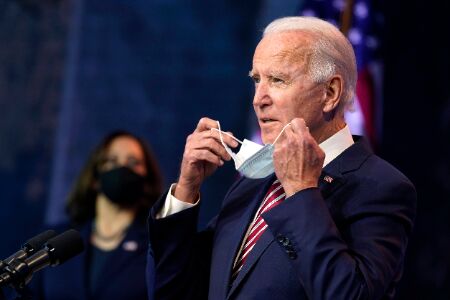The new 'old'

Recent developments in the US Presidential race drama seem to indicate that Donald Trump has taken a step along acknowledging his electoral defeat in the elections. Just this week, even as he vowed to continue contesting his defeat till the bitter end, he also indicated that he had instructed his staff and the GSA to start proceedings on the handover of office. The General Services Administration (GSA) is an important but little publicised agency that handles the vital task of assigning office space and resources to transition teams and coordination between different federal agencies. On its website, GSA variously describes itself in the role of the Government's landlord, vehicle management and acquisition service, IT solutions provider, financial management provider and the list goes on. In short, it is an agency that facilitates the day-to-day functioning of the US Government. As might be expected, such an office comes with the added responsibility of staying apolitical. Since its inception in 1949, the GSA has overseen largely straightforward and non-contentious transfers of power between administrations. This time was different. Trump-appointed GSA head Emily Murphy made the decision to initially not begin the formal transition process based on 'contested' election results. As the Trump legal team slowly lost grounds with its appeals for recounts and claims of voter fraud being dismissed in court, pressure built on the GSA to act. Now the GSA has finally started the process of handing over the keys to the government to the Biden team. The transition website for President-elect Biden has now formally been changed to a US Government domain. More significantly, this has allowed Biden to announce the first of his many picks for what has been promised as a diverse cabinet that "looks like America". Biden has announced six picks for his cabinet and staff positions of which two — Chief of Staff and National Security Advisor require no confirmation hearing. Overall, his current picks are characterised as a return to old Washington with an emphasis on diversity. His picks, as the Republicans have also noted, are Ivy League graduate centrists with impressive portfolios and an outlook that favours broad international engagement. The Republicans naturally note all this in the context of labelling the new cabinet as one suffering from the ivory tower syndrome, where leaders grow out of touch with the people they govern. Discussion of what 'Real America' is aside, Biden's picks have noteworthy names that clearly indicate Biden's stance on certain critical issues. The first is Cuban-American lawyer Alejandro Mayorkas who has been announced as Biden's pick for US Secretary for Homeland Security. Aside from being the first Latino and foreign-born head of the department, Mayorkas is also an experienced candidate with the prior experience of being Deputy Secretary of the department in the Obama years. Mayorkas is a major proponent of legal immigration and has won the support of many pro-immigrant groups. If elected, he is expected to address the restrictive immigration policies of the previous administration and is a visible counter to the anti-immigrant rhetoric of the previous administration.
The second major pick that has elicited significant response is the possible addition of veteran statesmen and former US Secretary of State John Kerry to the Biden cabinet as special Presidential envoy for the climate. Kerry is noteworthy for two major agreements made during the Obama era, the Iran nuclear deal and the Paris climate agreement. Kerry is a famous and influential proponent of applying scientific temperament to climate change. In 2019, he launched an American coalition by the name of World War Zero for the purpose of urgently addressing climate change. He enlisted experts, celebrities, four-star generals, career politicians, etc., to start a worldwide conversation on climate change and the ways it can be addressed in the immediate context. As the Biden team has explained, Kerry will be a full-time head for a climate change mitigation effort and his experience and connections afford him "a seat at every table" regarding this conversation.
Overall, as signified by his all-important Secretary of State elect Anthony Blinken, Biden is looking to send the message that America is back on the table of world diplomacy. His cabinet picks are those who have significant experience in Washington with many being part of the former Obama administration. Biden's cabinet picks will have to work hard to reverse four years of Trump policies that pulled America away from its traditional stances on multilateralism and diplomacy. Concerns have been raised that this is simply a rehash of the Obama administration or that the more left-liberal sections of the Democratic Party will once again be unrepresented in an administration they helped to get elected. Cognisant of such pushbacks, Biden has stated that his administration will reflect the new American realities and while he may draw for his experience under Obama, he must ultimately face a new America. As many have summarised, a return to old America may not exactly be what America and its people need right now and Biden as a centrist must continue balancing expectations on all sides.



